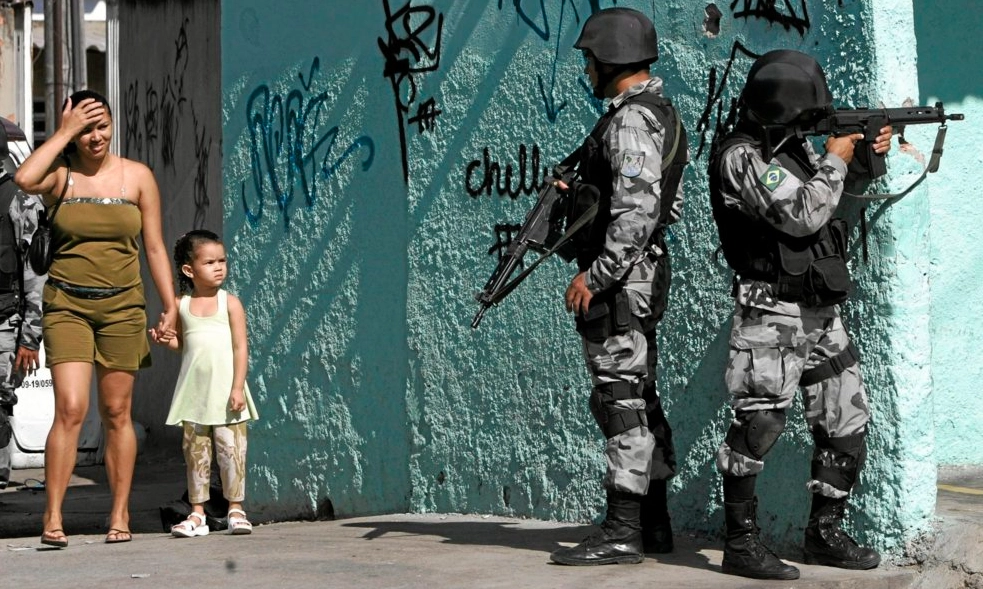In Latin America, the clear interference of the military forces in the internal security of the countries has been historically evidenced, a factor that has an impact on the functioning of the democratic order. In the case of the police forces, their military training and performance are criticized, without this meaning that they are assuming any kind of role typical of the armed forces. Taking as a reference the article “Militarization of the Police and Policialization of the Military Forces. Review of the phenomenon at the international and national level”, research conducted by William Guillermo Jímenez and Juan Pablo Turizo for the National Police of Colombia, we can observe that this is mainly due to internal factors of public order management in the case of the military, to the military organization of the police since its origins and changes in the conception of security and sovereignty of the states.
It is wise to remember that military forces in the world are intended to conduct operations aimed at defending sovereignty, independence, and territorial integrity, while police forces are constituted to ensure the maintenance of the conditions necessary for the exercise of public rights and freedoms.
Some countries mentioned by the authors in the article are presented as guiding examples. Brazil, Chile, Colombia, the United States, and Mexico reinforce the thesis put forward, while Germany offers a reference of success in the handling of this issue, after the unfortunate events of World War II.
However, it should be noted that each case is different due to circumstances of time, mode, and place. For this reason, we cannot resort to comparison factors, but can only limit the research to the consequences of either of the two phenomena that are the subject of this paper.
The research highlights greater relevance in the “policialization of the military forces” as a matter that transcends the normal, the legally established, and the logic of security. In this, experts on the subject agree, clarifying, first, that internal security is not a function of the military, and, second, that the police must do what is necessary to guarantee the fulfillment of their constitutional duty; this, in practice, implies special training and equipment.
Although it is not a general rule in democratic countries, it is important to consider other aspects of utmost importance, such as the protection of human rights under the treaties and conventions signed. The report mentions that “the armed forces are governed by a logic of war; their function implies a strong use of force, which is difficult to limit and, therefore, inadequate to deal with internal conflicts”. This implies adherence to existing regulations at the risk of causing serious consequences if they do not act within the legal framework.
The fact of not having delimited the role of each institution or force of order, due to the legal loopholes that exist, may imply the opening of windows of opportunity for the inconvenient existence of self-regulation and self-delimitation of functions. The most reliable case of this is Brazil, where authoritarianism overrides representative democracy.
The military have been protagonists in the political life of Latin America. The coup tradition left indelible traces in the minds of the population and, of course, in the psyche of the military. This coup genetics still acts on their contemporaries and that is why they cannot be alien to the protagonism and need to be in control; in a few words, to be loose wheels as “defenders of democracy”. Yet, legislators in one way or another have been complacent with this situation and have caused a good part of this problem. There are several reasons for this. First, the governments in power have been encouraging the participation of the military in police activities. In addition, unhealthy competition has been promoted among the same law enforcement institutions, creating a serious concern by establishing the measurement of results and productivity through data and indicators designed for the administration of private companies and not for the national defense system. For all these reasons, the police and armed forces in some cases have become political institutions commanded by governments that use them in a repressive manner, as a guarantor of the survival of a dictatorial regime.
The latter is the case of Venezuela, where the constitutional order was broken, and the forces of law and order blindly obey the incumbent president. In this case, they do not fulfill their democratic function and simply act at convenience.
As for the other phenomenon under analysis, the militarization of the police, we can indicate undoubtedly that in general, it is a matter that does not affect the democratic order in any way. In this case, the police based on necessity (demands of the internal conflict), operate with military tactics and equipment, but this does not mean that they assume roles that correspond to the military.
An example of this is Colombia, where the National Police’s tactical approach responds to the training and preparation acquired from friendly countries that from the beginning did not see basic police training as a way to prepare them to take on the internal conflict. Nevertheless, this did not imply that they failed to assume their mission role.
The Colombian National Police is considered atypical or hybrid. This refers to its formation, equipment, mystique, and organizational structure. However, despite the circumstances, it has never pretended to act as a military entity, contrary to the Colombian military that occasionally assumes police roles, facing serious difficulties, since they are not prepared for this, as it is not their nature.
An illustration of the risk of human rights violations of certain practices is the police forces of the United States, where the use of force has increased exponentially precisely because they have assumed much more military than civilian training. The military’s involvement in urban policing makes it even more prone to this type of problem.
In general, the negative impact on a country of the presence of its army in the cities, or the perception that a foreigner has when seeing a heavily armed military in the streets of any Latin American country, is not measured. Beyond imagining that these are preventive or dissuasive measures, they are associated with danger, with the presence of organized crime, with terrorism, and with other factors that affect the image of a country, even affecting its economy. Military forces acting outside the context and conception of their mission become a traumatic issue that impacts the tranquility of citizens.
In conclusion, and by way of reflection, the current concern is the constitutional demarcation in which the military forces are immersed. This has allowed them to be involved in internal security issues, mainly claiming the guarantee of peaceful coexistence, which is the same argument used by the police forces to make use of methods and tactics typical of the military doctrine acquired throughout their existence.
It is important to consider that, although this is indeed a critical issue with serious implications, it is time to review the different options for a solution, either by clearly demarcating the boundary that divides the mission and functions of the military and police or by redesigning the model and structure of the defense and internal security system to avoid interfering with or affecting the essence of citizen security.
*Translated from Spanish by Micaela Machado Rodrigues












